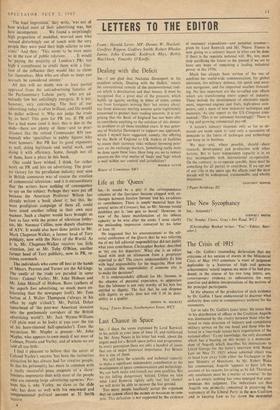Last Chance in Space
SIR.— 1 share the views expressed by Lord Renwick in his article in your issue of June 18, and reinforced by Mr. Airey Neave in his letter last week, about the urgent need for a British space policy and programme. In every generation there are only a handful of issues that are of major historical importance. For Britain this is one of them.
We still have the scientific and technical capacity to make a significant independent contribution to the development of space communication and technology. We can both make and launch our own satellites. But we are falling dangerously behind. Unless we take what Lord Renwick rightly calls 'our last chance' we will never be able to recover the lost ground.
Too many people heedlessly accept the argument that we cannot afford the money or resources to com- pete, This defeatism is not supported by the evidence
of necessary expenditure—and potential revenue— given by Lord Renwick and Mr. Neave. France is now giving us a salutory lesson in what can be done if there is the requisite national will. We, too, must stop sacrificing the future to the present if we are to have any hope of remaining a leading industrial power in the 1970s.
Much has already been written of the use of satellites for world-wide communication, for global television, for military defence, for quick and accu- rate navigation, and for improved weather forecast- ing. No less important are the so-called side effects which are transforming every aspect of industry. These include the development of electronic equip- ment, improved engines and fuels. high-speed com- puters, and a mass of new industrial techniques and materials. As one report to the US Congress com- mented: 'This is no astronaut boondoggle.' There is a big and growing commercial pay-off.
A nation's industry responds only so far as de- mands are made upon it—and only a succession of demands at the limits of technique and technology can keep us in business.
We may—and, where possible, should—share research, development and production with other nations. But to have independent capacity is in no way incompatible with international co-operation. On the contrary, to co-operate sensibly there must be something for all parties to contribute. If we opt out of our role in the space age the effects over the next decade will be widespread, irredeemable, and wholly disastrous.










































 Previous page
Previous page